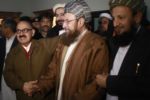
By Mujeebur Rahman
Pakistan government finds itself in a catch-22 situation whether to launch a full-scale military operation in the tribal areas or to give yet another chance to the hitherto failed peace negotiations to curb the growing militancy in the country.
After the attack on the airport in Karachi leaving 36 people dead including the 10 militants, pressure is mounting on the government to deal with terrorists entrenched in their strong base of North Waziristan. Taliban faction headed by Maulana Fazlullah claimed responsibility for the Karachi attack. The government has not shown any indication whether it plans to launch a military offensive or continue to stick to negotiations with the Taliban. Initial rounds of talks between the two sides bore no fruit.
Support for the negotiation process has narrowed down compared to the hopes when Prime Minister Nawaz Sharif announced, at an all parties’ conference in Islamabad, that he was in favor to talk peace with the militants. Secular political parties like the PPP, MQM and the ANP, which has seen hundreds of its leaders killed by militants in deadly attacks, backed Sharif’s initiative. Imran Khan’s PTI, known for its soft stand on the Taliban and has in the past opposed use of force against the Taliban. Khan, however, supported taking stern action against terrorists in wake of the terror unleashed at Karachi airport by TTP.
Analysts favor use of military means to deal with the Taliban.
Former Ambassador and member of Pakistan’s government nominated peace committee, Rustam Shah Mohmand told VOA Deewa Radio that he was in favor of military operation against perpetrators of the Karachi attack. “Those who do not want to talk and continue to carry out attacks on civilians and the security forces should be brought to justice,” he said adding the government should hold talks with Khan Said, known as Sajna. The Sajna Group has broken away from the mainstream TTP. Mohmand also said government should renew its peace treaty with Hafiz Gul Bahadar, a pro government Taliban commander in North Waziristan. Hafiz Gul Bahadar has been sticking to a 2006 peace agreement with the government.
The right wing political party Jumaat e Islami still wants to own the Taliban. In a tweet from his account, the Amir of Jamaat-e-Islmai, Siraj Ul Haq said “Taliban should not be pushed to the wall, instead, should be embraced.”
Rahimullah Yousafzai, a senior Peshawar-based journalist, who stepped down as member of the
Government Taliban peace committee, told Deewa Radio that the government peace process with the Talbian cannot move forward under the situation. He said “the talks practically are over and the situation is moving in a direction where military operation or fighting between the government and the Taliban is inevitable.” He warned, however, that Taliban have the capability to launch attacks anywhere, anytime.
This is not the first time that talks between the government and the Taliban have been in jeopardy. The TTP accepted PML (N) government’s offer to start a negotiation process but backed out after its leader Hakeemullah Mehsud was killed in a drone strike in November 2013. The process resumed later, though, followed by reports that Gen. Sharif told the Prime Minister that time for talks ended after attacks on soldiers in Waziristan.
TTP used US drone strikes as an excuse for launching its attacks, which happen mostly in Khyber Pukhtunkhwa province. And that is a narrative that right wing political parties and Pakistani media own. But in fact December 26, 2013 was the last day the U.S. carried out a drone strike inside Pakistan. Even after drone strikes had stopped, militants continued to carry our terrorist attacks, killing dozens of people, mostly civilians. According to South Asia Terrorism Portal, a web site tracking casualties in militant attacks, about 1893 people were killed in 2014, many of them civilians. Almost after a gap of six months, suspected drone strikes have once again been resumed in Waziristan on Wednesday.
New America Foundation, a U.S. think tank, claims to have tracked every drone strike that has happened inside Pakistan. The group puts the total number of drone attacks over the past decade at around 370. The group says drone strikes have so far claimed the lives of 258 civilians and nearly 1600 militants including more than 50 senior Taliban, al-Qaida and leaders from other affiliated groups. The foundation says no civilian casualty from a drone strike has been reported in 2013. The Pakistani media puts the civilian toll far higher than these figures but they fail to attribute it to a source or where or how they get the data.
According to official figures, more than 60,000 people, mostly Pashtuns have lost their lives to terrorism and Pashtuns continue to pay a deadly price for what is an ongoing scenario on their land.
